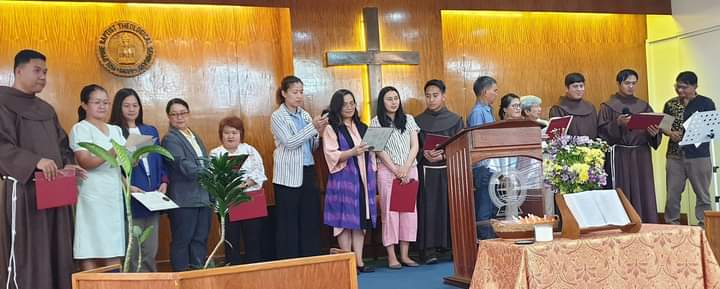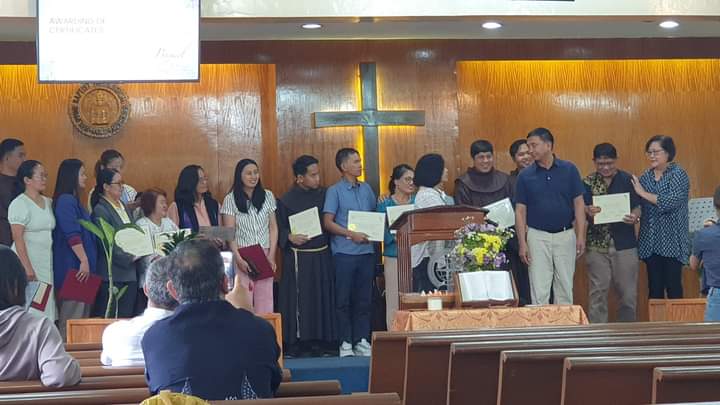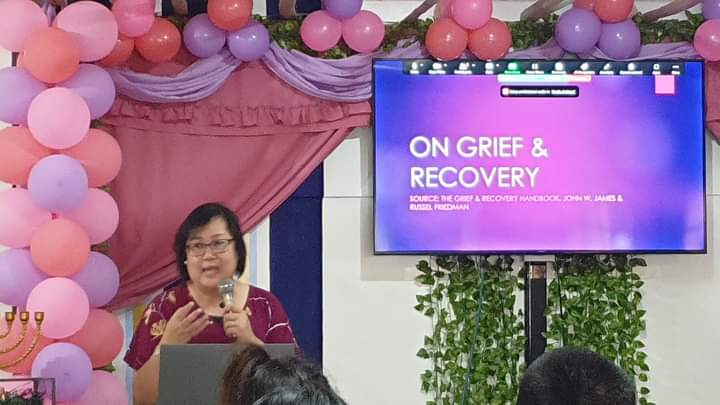The presentation reviews the psychological and theological roots (primarily) of the Clinical Pastoral Movement as developed by Anton Boisin.
Congrats to New Diplomate
Bukal Life Care wishes to congratulate Chaplain Renato Eustaquio for passing his board for Diplomate of Pastoral Supervision, with CPSP-Philippines. Diplomate Renato trained under Bukal Life Care, and did his S.I.T. program supervised by Diplomate Celia Munson.


The following is the message from Diplomate Renato:
I thank God for this meaningful journey of pastoral care and supervision.
I started this journey in 2007 with Rev Chaplain Debra Elaine Miller as my first CPE Supervisor.
Then I went on overseas missions for 5 years.
As the Lord led me back to my home country in 2012, my seminary classmates Rev Dr Bob Munson and Diplomate Celia Munson visited us in Bulacan and left a thick manual of College of Pastoral Supervision & Psychotherapy Philippines.
That visit led to 3 more CPE units. Three years of diligent studies and travel to Baguio from time to time for the intensive training, until I was Board Certified as a Clinical Chaplain and Pastoral Counselor by CPSP Phils in 2017.
In 2019, The Chaplains Office was set up in Dr Yanga Hospital, and become the accredited CPE Center of CPSP PH in Bulacan. Then we started to equip future pastoral clinicians through our blended program. We have had chaplain trainees based in Japan, Australia, Canada, the UK, and from different cities and provinces in the Philippines. We have trainees who are professional chaplains, from corporate discipline, social workers, psychologist, pastors, missionaries, church and convention leaders.
In 2021, Rev Debbie Miller started to help as TCO Didactic Instructor providing clinical contents needed by our trainees.
God also opens to us doors for corporate chaplaincy, hospital chaplaincy, and school chaplaincy services.
We see the Lord providing all these opportunities as His affirmation of The Chaplains Office commitment to equip future clinically trained ministers, clinical chaplains, pastoral counselors, and diplomate in clinical pastoral supervision.
God is faithful.
Thank you Rev Dr Paul Tabon, Rev Dr Sim Dang-awan, Rev Dr Ryan Clark, Rev Dr. Larry Paul B. Gusto, Diplomate Merlita Paghubasan Montecastro , Diplomate Vo Cristobal Canoy, Rev Dr Calixto Sodoy, Chaplain Jehny Pedazo, and to our CPSP family for guidance and inspiration.
Thanks to our Bukal Life Care family and Philippine Baptist Theological Seminary where I was trained for pastoral care discipline for 4 years.
Thanks to Dr Yanga Hospital for being the home of The Chaplains Office. To Ya
For Doxo Ingredients and sister companies for the opportunity to serve as their corporate chaplain.
And to The Chaplains Office family, our past and current trainees.
Agnes Barnedo
Marilyn Nitram
Jhoi Pergis
Gina Ventura
Hanna Eumee Castro
Eduardo Domingo
Eddie Briones
Junel Chavez
Becky Gambuta II
Dan Abangco
Ditas Martin Leonardo
Norminda Forteza
Tessie Chua
Abby Rose Lopez Abraham
Kristine G. Eustaquio
Reiner Simple Bartolome
Your valuable insights on every class, case, and activity bring so much learning experiences to each one of us.
Now that God has humbly enabled me to become a Diplomate in Clinical Pastoral Supervision (DPS), I pray that the little that I could offer and contribute to our CPSP family would help further the chaplaincy and pastoral care ministry in the Philippines and beyond. Supervising pastoral clinician trainees, equipping them for pastoral care has brought so much joy in my heart. Healing through pastoral caring has grown in me, as I see God’s hands guiding me in this meaningful and transforming journey.
Thank you Dra Joy and Dane. To Eustaquio, Esguerra, and Berces family.
Thank you to my church family: IHJCC and DCC.
And thank you for all who have helped us in ways possible, and have prayed for us. God bless you all.
To God alone be the glory.
All glory, and honor, and praise belongs to the LORD God Almighty, the KING of kings and LORD of lords!!! Jude 1:24
Not to us, O LORD, not to us but to your name be the glory, because of your love and faithfulness. Psalm 115:1
Caring form the heart,
Rev Chaplain Nato
Diplomate in Clinical Pastoral Supervision (DPS)
College of Pastoral Supervision and Psychotherapy Philippines
Two Summer CPE Groups Starting in May 2024
We have two groups starting up in May.
#1. Our Full Unit Summer Intensive will be from May 21 until August 9 (approximately 12 weeks).
#2. Our Half Unit Summer Intensive will be from May 27 until July 12 (approximately 7 weeks).
Both groups are face-to-face units being held in Baguio City, Philippines with a mixture of hospital and community training. The training is certified by CPSP-Philippines.
For additional information please see our BROCHURE.
For a CPE application, please download it, fill it out, and return to bukallife@gmail.com. CLICK HERE for the application.
For other information or questions, please email us at bukallife@gmail.com.
Why It is Clinical Pastoral TRAINING not Clinical Pastoral Education
Recently, the College of Pastoral Supervision and Psychotherapy (CPSP) decided to stop calling its training program Clinical Pastoral Education (CPE) and start calling it Clinical Pastoral Training (CPT). Why is that?
Well, there are at least three reasons— perhaps more.
#1. Clinical Pastoral Training was the original term of the process developed by Anton Boisen for theological students. Years letter, it became known as Clinical Pastoral Education (CPE). However, CPSP seeks to embrace the Boisenian roots of the movement. As such, a return to the original nomenclature was deemed important.
#2. The process of the program is better understood in terms of Training than Education. While the terms overlap somewhat in meaning, “education” is more theoretical and knowledge-based in its orientation. Training is more oriented towards learning practical skills particularly related to a specific vocation. It tends to be more hands-on and than education, and less dependent on the classroom.
#3. The program (CPT) as it presently exists presumes a theological and ministerial education (particularly in terms of a Master of Divinity degree or similar). This educational foundation is what the training is built off of.
A couple of more bits of information on this issue are in the following:
A General Discussion of Differences between Training and Education
Does this mean that we at Bukal Life Care will throw away the term “Clinical Pastoral Education” (CPE) and replace it with “Clinical Pastoral Training” (CPT)? The short answer is “Not at this time.”
That being said, we intend to focus on the program as a TRAINING PROGRAM led by SUPERVISORS in a TRAINING ORGANIZATION, and NOT an EDUCATIONAL PROGRAM led by TEACHERS in an EDUCATIONAL INSTITUTION.
Our focus is to hone skills of ministerial professionals in the dual crafts of clinical chaplaincy and pastoral counseling. This process is primarily practical adult training that is built on the foundation of a theological education.
At the same time, we don’t seek to confuse people. Worldwide, the program we maintain is most commonly known as CPE. We don’t seek to make people think that the CPT program we have is different in substance. While there may be subtle differences, we are part of the same clinical pastoral movement that started in 2025 in the United States and 1965 in the Philippines.
Grief and Recovery Seminar
Spring Updates
History of the Clinical Pastoral Movement in the Philippines (Brief Presentation)
The following is a short presentation on the History the Clinical Pastoral Movement in the Philippines (1965-Present). Click on the link below to view it.
Commissioning Service
March 7, 2024, we held a commissioning service for 17 trainees who participated in CPE groups completing in November and December 2023. Below are a few photos. Two of the trainees, Dr. Jun Vestidas and Ms. Jezza Pingo, have now completed their 4 units and are preparing for their certification boards with CPSP-PH.
Mr. Fritz Melodi, Pastoral Care instructor at Philippine Baptist Theological Seminary gave the inspirational message for the trainees and attendees.




Bad Historical Advice on Grief
<Taken largely from “St. Jerome’s Bad Advice to the Grieving” by Bob Munson>
Pastoral Counseling seeks to, in part, draw from the church tradition of pastoral care that is two millennia old. However, we must also critique the church’s guidance in light of Scripture (primarily) as well as other sources. Sometimes the great heroes of the faith can have blind spots in terms of practical guidance and ministry. An excellent example of this is St. Jerome– also known as Jerome of Stridon (circa 342 – 420AD).
His great claim to fame was his translation of the Bible from the original languages in to common Latin (Vulgate). Related to this was the value he placed on understanding both Greek and Hebrew in Biblical studies— a characteristic rare in the Western church. However, his advice to a grieving friend points to a failure to empathize and express Christian love appropriately.
Drawing from the post listed above, which reflects on a letter described in the book, Jerome: His Life, Writings and Controversies, by J.N.D. Kelly.
———————————
“Kelly summarizes a letter from Jerome to a woman named Paula. Paula was a disciple of Jerome, along with her daughter, Blesilla. Jerome felt very close to both of them. However, Blesilla died and Paula felt great grief. Quoting Kelly regarding Jerome’s letter to Paula,
Jerome, who seems to have regarded Blesilla as now belonging at least as much to himself as to Paula, was shocked by her distress, and took her to task in no uncertain terms. The letter, which he intended as a threnody, and which starts off as a eulogy of Blesilla, soon becomes a rebuke for her mother’s excessive grief, and at the same time a terrifying exposure of his own religious attitude. First, he concedes that tears have their place (did not Jesus weep for Lazarus?), but protests that his own agony is no less than Paula’s. But the Christian should be able to bear the most shattering blows with meek thankfulness, knowing that God, who controls all things, is good. Secondly, however, the dead man for whom mourning is appropriate is the sinner who has gone down to hell; Blesilla deserves congratulation, for she has passed from darkness to light to meet Christ face to face. Thirdly, Paula should recall that she is not only a mother but a Christian, and a dedicated ascetic at that. The truly Christian reaction to death was that of the heroic Melania: when she lost her husband and two of her sons in quick succession, who shed no tear but, prostrate before Christ, exclaimed with a smile, ‘Now I shall serve You, Lord, all the more readily, since You have freed me from this burden.; Finally, Paula’s grief is disgraceful to the point of sacrilege. It must be sheer torture to Blesilla, as she consorts with blessed Mary and the saints, to see her own mother behaving in a manner so displeasing to Christ.
Kelly, J.N.D., JEROME: HIS LIFE, WRITINGS, AND CONTROVERSIES (New York: Harper & Row Publishers, 1975), 99.
Jerome had a position of authority over her as her discipler. As such, he was in a position to abuse. This form of abuse is often described as “spiritual abuse.” In this case, I would categorize this form of spiritual abuse as theological abuse since the method is linked to expressing a form of theology that is harmful/coercive. Here are a few things that Jerome gave as theological guidance to Paula.
#1. On the positive side, Jerome didn’t deny that Jesus did shed tears at the death of Lazarus. However, based on the broader context, it looks like this was shared as a sort of lampshading. The reason I am saying this is that in the letter, he appears to be saying that crying is bad, and that sadness is wrong, and so acknowledges the most well-known counter-argument before ignoring its ramifications later. (I don’t have Jerome’s letter— Letter 39, 384 AD— and so I am responding to the summary by Kelly.)
#2. Jerome seems to be saying, “I love Blesilla as much as you, and so if I am not grieving like that, neither should you.” This is pretty classic. One of the classic responses to grieving is, “I know EXACTLY how you are feeling.” This is often meant well, but does have the sting of saying, in effect— “Don’t share with me how you feel, because I already got it.” This is not a good pastoral response. First, it is not true. Jerome does NOT know what it is like to lose a daughter, and he is not in a position to figure out who is struggling more. Second, even if two people, theoretically, had the exact same amount and quality of attachment to someone who has died, that does not mean that the grief response will be (or should be) identical. God created individuals, not clones.
#3. Jerome implies that one cannot be thankful to God while grieving. Another, bad response to grieving is, “You really should be counting your blessings!” As one reads the Psalms of Lament in the Bible, one finds songs that express deep sorrow along with both thankfulness and hope. We are complex beings. Sadness and thankfulness are not mutually exclusive.
#4 . Jerome suggests that we shouldn’t really grieve because everything that happens is good, because God is good. This relates to a gripe of mine… the responsive formula— “God is good…” “All the time.” “And all the time…” “God is good.” We may say that God is loving. We may say that God is benevolent. However, when we say, “God is good” I think the vagueness of the term requires us to ask the perspective. From a phenomenological or anthropocentric viewpoint, God is NOT always good. That is the point of the Lament Psalms, as well as some of the various prophetic complaints to God in the Old Testament (particularly). We learn and grow through dealing with the challenge that “God is good… but NOT all the time. Not all the time, but God is STILL good.” But even if God is good all the time (on all levels of interpretation), God created us with deep attachments. We were designed to hurt from loss. Grieving doesn’t undermine this. In fact, one could even argue that grieving is a God-given gift to help us deal with deep loss.
5. Jerome states that Blesilla is in a better place so we should be celebrating this. I know some Christians like to talk about funerals as “Celebrating Life” rather than seen as memorializing one lost to death. I don’t suppose there is anything wrong with this. However, grief is not based on where the person is at but where the griever is with respect to the other. Suppose a cherished family heirloom is stolen in a house break-in, and you are sorrowing. If a well-meaning neighbor sought to comfort you that perhaps it has now drifted into the hands of someone who will take care of it better than you, I think you would be justified in questioning your neighbor’s mental fitness. Your sorrow is based on the personal and familial loss and nothing to do with it’s new state. When we lose a loved one, we may not grieve as those who have no hope, but we still grieve… and should grieve.
6. Jerome argues that a true Christian reaction is to find joy in the loss. He uses the example of Melania, a Roman Christian who lost husband and two sons and then left for Palestine to found a monastery. The story of her thanking God (seemingly) because He took away impediments to her serving Him, sounds pretty monstrous. I assume the reality is more complex, but if one takes it as Jerome presented it, it suggests an attitude about family and relationships that appears to be far from a Christian ideal.
7. Jerome claims to read Blesilla’s mind in heaven and thinking that she would be “tortured” to see Paula grieving. This is tied to a well-known response to the grieving that, “_________ would not want you to grieve.” Of course, these respondents have no idea what the dead want. Most commonly, what is really meant is “I have gotten tired of seeing you grieving.”
8. Jerome finally claims that Paula’s grieving displeases God. This is just a variation of the previous argument with “God doesn’t want to see you grieve.” Essentially, grieving is seen as a sin by Jerome. Why would we assume this of God? Rather, this expresses the theological perspective of Jerome and it is pretty abusive.”
——————
Good advice might come fairly close to the opposite expressed by Jerome.
- See in Christ a model for dealing with loss— grieving openly and freely.
- Recognize that each person may deal with loss differently. Tears are common, but so are desires to memorialize the person, or be drawn into activism (among other things).
- It is very appropriate to be both sad and thankful— thankful to God for allowing one to have the other in one’s life, while simultaneously grieving their loss.
- It is okay to question God. Much as the Psalmist(s) lamented, it is healthy to learning and growth to talk to God when He seems cruel or unfair.
- Recognize that grieving is a healthy part of letting go. The one who has passed on may indeed be in a better place, and perhaps is now free of immense suffering— but the sadness is not about where they are now, but that they are no longer close.
- Joy is a Christian emotion, but so is sadness and even anger. Rejecting or denying some hinders our healing.
- Our grieving has nothing to do with what the dead desire or the dead hate. Grieving is about what we need to do. The one who died in most cases has also suffered loss in the past and has gone through the grieving process. Now it is our turn.
- God is not against grief. God wants to comfort us in our grief and suffering, but also grow through this experience so that we can comfort others as they go through similar experiences (See II Corinthians 1).
February 2024 Updates
Greetings to everyone! At Bukal Life Care, we are fully up an running after the holiday break. Clinical Pastoral Education (CPO) is just finishing up, supervised by Chaplain Vo. Two Clinical Pastoral Education (CPE) groups have recently started supervised by Chaplains Crista and Bhab. Doc Bob and Chaplain Celia are leading a course, “Types of Christian Counseling” at Faith Bible College, while Mr. Fritz Melodi is teaching two courses: “Intro to PC&C” and “Counseling Theories/Methods.”
Summer Intensive CPE is Coming!! It will be from May 22 to August 14. For those interested, contact us. Click below for brochure for details.




